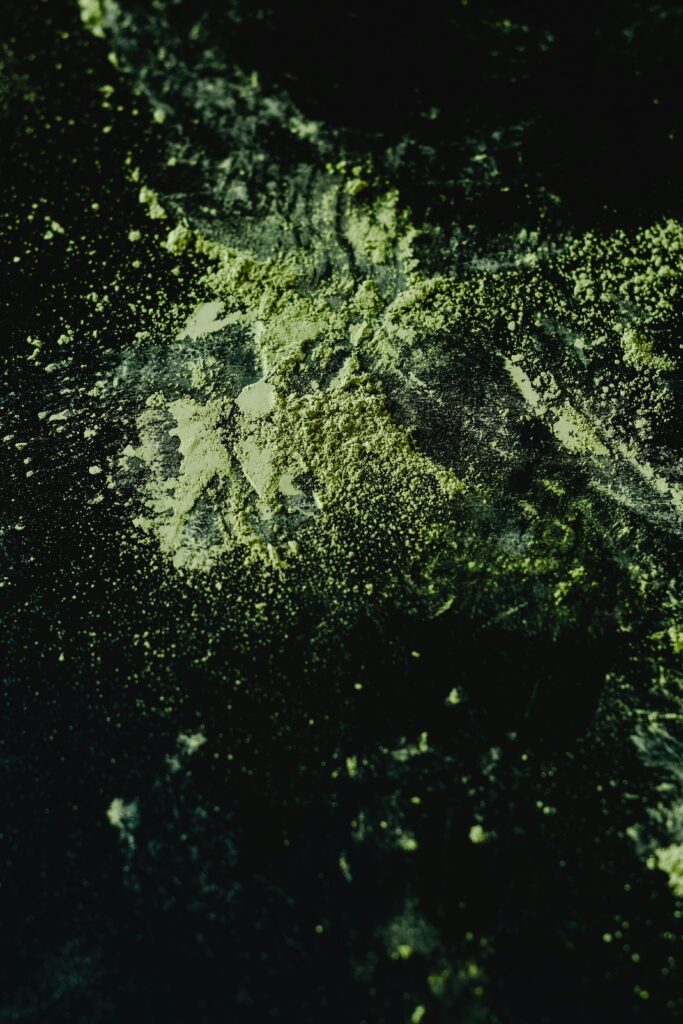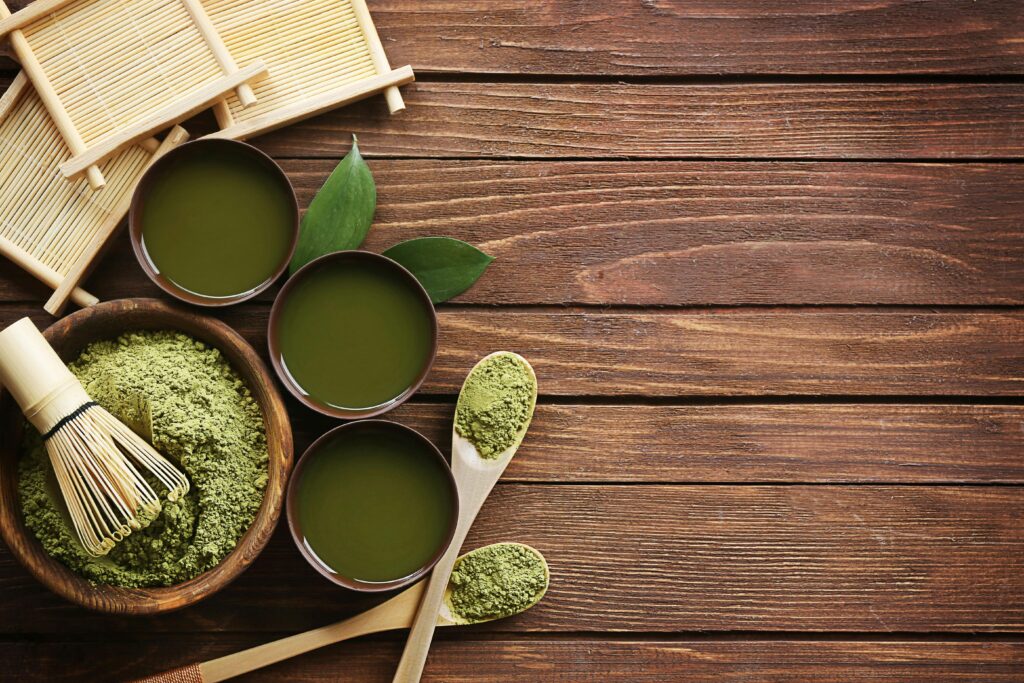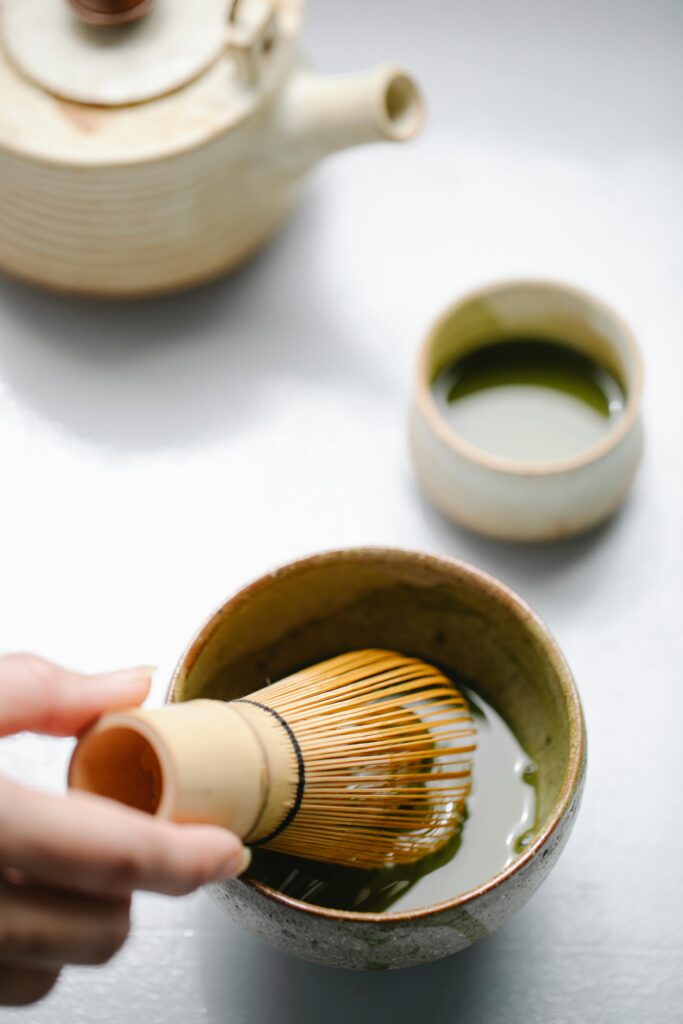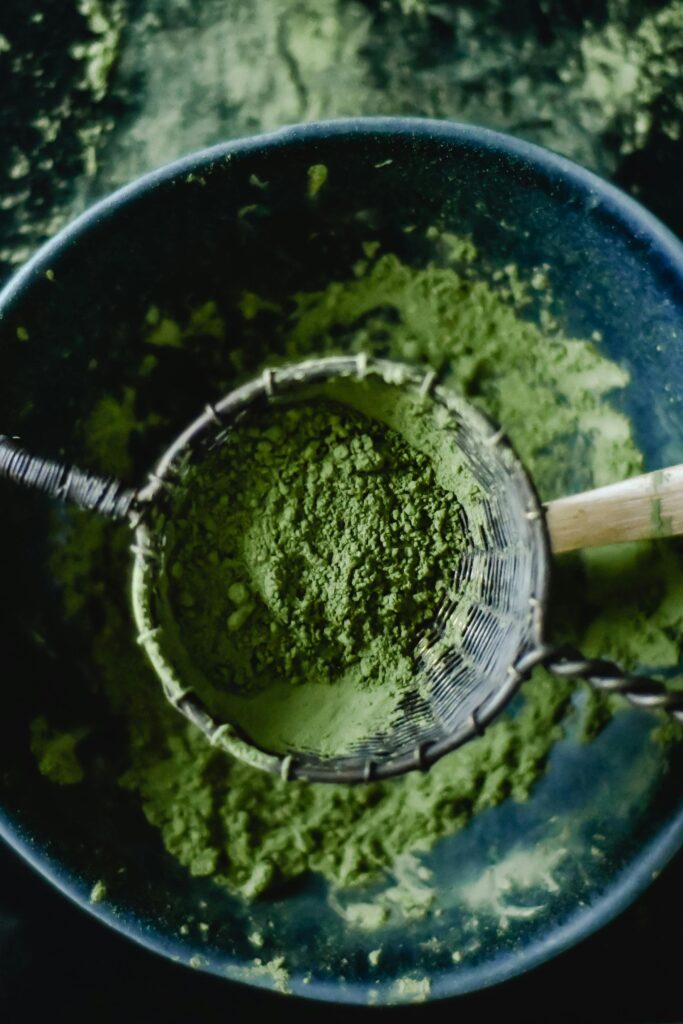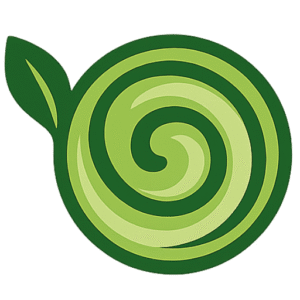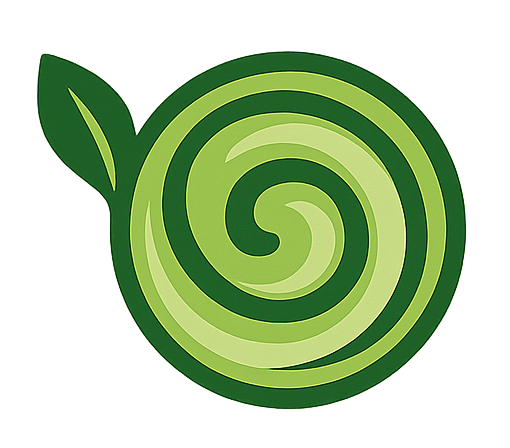Matcha and Health Goals
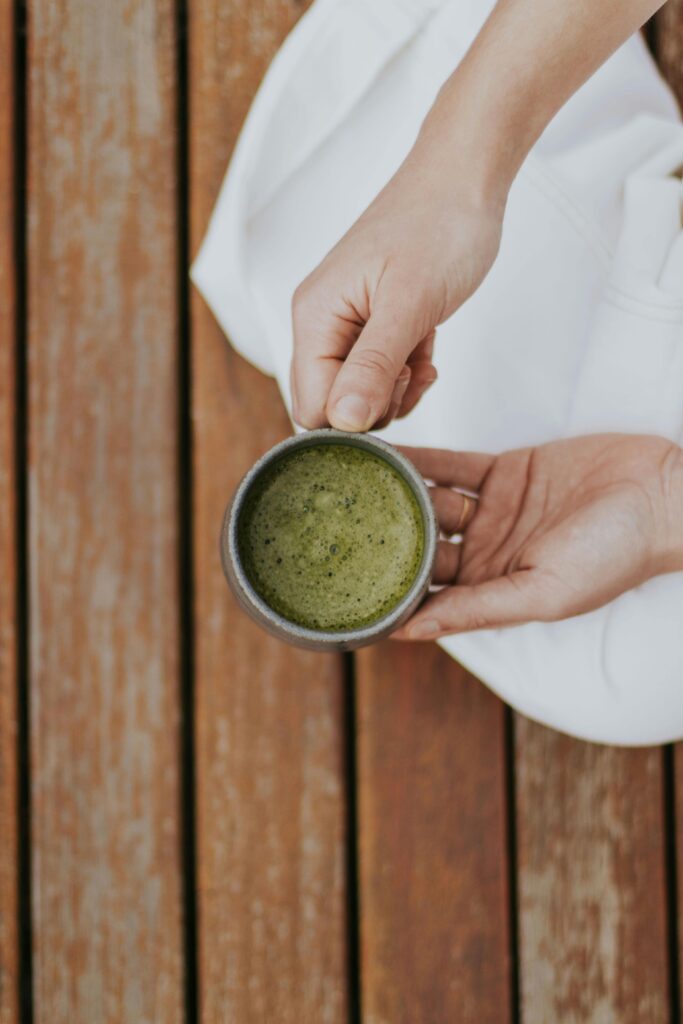
Optimizing Matcha Consumption for Different Health Goals
Sustained Energy
To achieve sustained energy throughout the day, consume matcha in the morning or early afternoon. The combination of caffeine and L-theanine in matcha provides a balanced energy boost without the jitters commonly associated with coffee.
Research demonstrates that matcha contains approximately 35-70 mg of caffeine per serving (1-2 teaspoons), along with 20-40 mg of L-theanine per gram of matcha powder. This unique 1:2 to 1:4 ratio of caffeine to L-theanine creates a synergistic effect that promotes smooth, sustained energy without the typical caffeine crash. The L-theanine modulates caffeine’s stimulatory effects by increasing alpha brain waves and regulating neurotransmitters, resulting in calm alertness that builds gradually over 30-60 minutes and lasts for several hours.
Optimal Timing: Morning consumption (7-9 AM) or early afternoon (2-4 PM) maximizes benefits while avoiding sleep disruption. Effects typically peak 1-2 hours after consumption.
Cognitive Focus
For enhanced cognitive focus, drink matcha about 30 minutes before engaging in mentally demanding tasks. The L-theanine promotes alpha wave activity in the brain, improving attention and memory.
Scientific studies reveal that L-theanine increases alpha brain wave activity associated with wakeful relaxation and focused attention without drowsiness. It also reduces stress-related cognitive decline by lowering cortisol and anxiety while improving selective and sustained attention and reaction times. The amino acid works as a glutamate reuptake inhibitor and acts on GABA-A receptors, providing neuroprotective effects.
Research by Owen et al. (2008) demonstrated that 100 mg of L-theanine combined with 50 mg of caffeine improved cognitive measures including subjective alertness, speed and accuracy on attention switching tasks, and reduced susceptibility to distracting information. Multiple studies confirm that this combination improves attention, reaction time, and cognitive performance more effectively than either substance alone.
Recommended Dosage: 1-2 teaspoons of ceremonial grade matcha (providing approximately 40-80 mg L-theanine and 35-70 mg caffeine) consumed 30-60 minutes before cognitive tasks.
Exercise Support
Consume matcha 30 to 60 minutes before exercise to benefit from its metabolism-boosting and endurance-enhancing properties. The antioxidants in matcha also help reduce exercise-induced oxidative stress.
Matcha’s EGCG (epigallocatechin gallate) and catechins boost metabolism and fat oxidation during exercise, enhancing endurance and energy utilization. Studies show that catechins stimulate lipid utilization and fat oxidation both at rest and during exercise, potentially improving endurance capacity. The caffeine in matcha further supports energy and performance by increasing alertness and physical capability.
Research indicates that EGCG reduces obesity and increases fat metabolism partly through AMPK activation. The combination of caffeine and L-theanine may also improve physical performance by maintaining focus during demanding workouts, particularly those involving changing stimuli such as CrossFit and Hyrox training.
Pre-Workout Protocol: Consume 1-2 teaspoons of matcha 30 minutes before training for optimal absorption and performance enhancement.
Stress Management
To support stress management, enjoy a cup of matcha in the late afternoon or early evening. The calming effects of L-theanine can help reduce anxiety and promote relaxation without causing drowsiness.
Clinical trials demonstrate significant stress-reducing effects of matcha consumption. A randomized controlled study found that participants who consumed 2 grams of matcha daily showed significantly lower anxiety (measured by STAI test) and reduced physiological stress markers (salivary α-amylase activity) compared to placebo groups. The stress-reducing effect was particularly notable when matcha was consumed continuously for 7-15 days.
L-theanine reduces stress by:
- Increasing GABA levels, the brain’s primary inhibitory neurotransmitter
- Modulating dopamine and serotonin production for mood stability
- Reducing cortisol production during stressful situations (23% reduction in studies)
- Lowering blood pressure under physical and psychological stress
- Promoting alpha brain waves associated with relaxation without sedation
Research by Unno et al. (2018) found that matcha consumption at doses of 33-50 mg/kg significantly suppressed stress-induced adrenal hypertrophy in mice, with effects dependent on the ratio of L-theanine and arginine to caffeine and EGCG. For optimal stress-reducing effects, matcha should contain more than 17 mg/g of theanine, with a molar ratio of caffeine and EGCG to theanine and arginine less than 2.
Stress Relief Dosage: 2-3 grams of high-quality ceremonial grade matcha daily, consumed consistently for best results. Effects on anxiety and stress are typically observed within 8-15 days of regular consumption.
Quality and Preparation Tips
- Choose ceremonial grade matcha: Contains the highest L-theanine content (20-40 mg/g) and best flavor profile due to shade-growing methods that increase amino acid levels
- Proper water temperature: Use water at 70-80°C (160-175°F) to preserve heat-sensitive compounds and maximize L-theanine extraction
- Avoid excessive additives: Minimize sugar and sweeteners to maintain matcha’s natural benefits and prevent blood sugar spikes that can increase stress
- Consider timing carefully: While L-theanine can mitigate caffeine’s sleep-disrupting effects, avoid consumption within 6 hours of bedtime if sensitive to caffeine
- Start with lower doses: Begin with 1 teaspoon (approximately 1.5 grams) to assess individual tolerance, as caffeine metabolism varies genetically
Important Considerations
The quality of matcha significantly impacts its health benefits. Studies analyzing matcha sold in Japan versus overseas markets found that approximately 42% of Japanese matcha samples met the criteria for stress-reducing effects (theanine >17 mg/g and optimal component ratios), while only 1 out of 67 overseas samples met these standards. This emphasizes the importance of sourcing high-quality, authentic Japanese matcha from reputable suppliers.
Individual responses to caffeine and L-theanine vary based on genetic factors, tolerance, and sensitivity. The FDA recommends a maximum daily caffeine intake of 400 mg for most adults, while L-theanine has been shown to be well-tolerated at doses up to 1,200 mg per day. However, beneficial effects are typically observed with 200-400 mg of L-theanine daily.
For those seeking the cognitive and stress-reducing benefits of matcha without significant caffeine intake, low-caffeine green tea preparations or L-theanine supplements may be alternatives, though they lack the synergistic effects and complete nutritional profile of whole matcha.
Frequently asked questions
We’re here to help with all your questions and answers in one place. Can’t find what you’re looking for? Reach out to our support team directly.
What's the best time to drink matcha for energy and focus?
Timing matters for getting the most from matcha’s energy and focus benefits. You’ll want to consume matcha 60 minutes after waking up rather than immediately—this helps avoid interfering with your natural cortisol production. The L-theanine and caffeine reach effective levels about 45-60 minutes after consumption, so plan accordingly before demanding mental work.
For sustained energy throughout the day, mid-morning works well as a productivity boost. Avoid drinking matcha after 2-3 PM since the caffeine can stick around for 3-6 hours and disrupt your sleep. If you’re caffeine-sensitive, start with smaller doses around 1 gram and track how your body responds before increasing.
Can I drink matcha on an empty stomach?
It depends on your individual tolerance. Matcha’s caffeine and catechins can cause stomach discomfort, nausea, or increased acidity when consumed on an empty stomach. Many people experience mild digestive issues or queasiness this way.
That said, some folks tolerate it just fine. If you want to experiment, start with a small amount and see how you feel. Consuming matcha with light protein or fat might extend energy duration, though this could reduce antioxidant absorption slightly. There’s no universal answer—your physiology determines what works best for you.
How much matcha should I drink for exercise performance?
Research suggests consuming matcha 30-60 minutes before workouts might support endurance and fat oxidation during moderate-intensity exercise. A standard serving of 1-2 grams (about 1 teaspoon) contains roughly 60-70 mg of caffeine, which can enhance workout performance without overwhelming your system.
The effects are modest though—matcha supports but doesn’t replace proper training and nutrition. Some people also drink matcha post-workout for recovery benefits from the antioxidants. Just remember that hydration remains crucial and matcha doesn’t replace proper fluid intake during exercise.
What happens if I drink too much matcha?
Excessive matcha consumption—typically above 8-10 grams or 8 cups daily—can lead to caffeine overload symptoms. You might experience headaches, upset stomach, nausea, jitters, and trouble sleeping. The high tannin content can also interfere with iron absorption when consumed in large amounts.
Stick to moderate intake of 2-4 grams daily (1-2 servings) for most people. Even with L-theanine’s calming effects, excessive caffeine impairs performance and wellbeing regardless. If you’re new to matcha or caffeine-sensitive, start with 1 gram servings and adjust based on your response.
Does matcha quality affect its benefits for focus and energy?
Yes, quality makes a real difference. Higher-grade ceremonial matcha typically contains more L-theanine, antioxidants, and balanced caffeine levels compared to culinary grades. This translates to better support for sustained energy, mental clarity, and reduced jitters.
Ceremonial grade also tastes smoother and less bitter, making it easier to prepare properly at the ideal temperature (160-175°F). Culinary grade works fine for smoothies or lattes but may have lower nutritional potency. When you’re optimizing matcha for specific health goals, investing in quality ceremonial grade gives you more of the beneficial compounds you’re after.
How long do matcha's effects last compared to coffee?
Matcha provides a longer, steadier energy curve than coffee. The caffeine from matcha is absorbed more slowly and typically lasts 3-6 hours, giving you sustained alertness without sharp peaks. Coffee effects tend to hit quickly but wear off within 1-2 hours, often followed by a noticeable crash.
The L-theanine in matcha works synergistically with caffeine to smooth out the stimulation—that’s why many people experience fewer jitters and anxiety compared to coffee. This makes matcha particularly useful for extended focus sessions or endurance activities where you need consistent energy rather than a quick spike.
Should I adjust my matcha routine based on my goals?
Absolutely. Personal experimentation is key since individual responses vary based on genetics, caffeine tolerance, and lifestyle factors. For energy, try morning consumption 60 minutes after waking. For cognitive work, time it 45-60 minutes before demanding tasks. For exercise, consume 30-60 minutes pre-workout.
Track relevant metrics for your specific goals—energy levels, focus duration, workout performance, or stress markers—while adjusting variables like dose, timing, and preparation method. Some evidence suggests lower doses might support creative tasks while standard doses suit analytical work, though this varies significantly between individuals. Maintain realistic expectations: matcha supports but doesn’t replace fundamentals like adequate sleep, balanced nutrition, and regular exercise.
Discussion: Matcha and Health Goals
